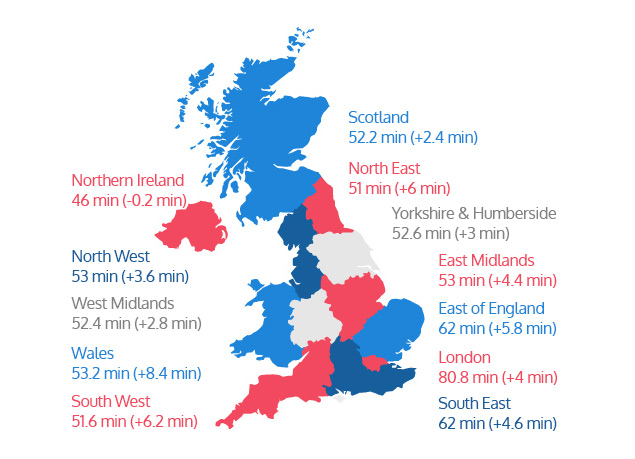The time it takes employees to get to and from work has increased over the past decade, even if they walk or cycle. Travel times to and from work are now five minutes longer than in 2007, according to analysis from the TUC.
Rail commuters face the longest journeys, taking an average of 131 minutes a day – an increase of four minutes on 10 years ago. Drivers spend 52 minutes on the road to and from work, up by three minutes, while travelling by bus saw the biggest increase, up seven minutes to 79 minutes per day.
Not only is the time spent commuting an issue, the nine-to-five culture with its peak travel times generates congestion. And the rush-hours on railways, underground and road networks increase stress for commuters” – Phil Flaxton, Work Wise UK
The TUC blames growing commutes on three main factors: low government spending on transport infrastructure; employers not offering flexible and home working; and real wages falling while house prices increase, making it harder for people to live close to where they work.
Londoners take the longest to get to and from work, travelling for 81 minutes each day, 23 minutes more than the UK average, although travelling by Underground increased the least, up one minute on 10 years ago.
Most areas of the UK have seen commute times increase, with the exception of Northern Ireland. Wales experienced the highest growth with commute times jumping from 45 minutes to 53 minutes in a decade.
TUC general secretary Frances O’Grady said: “It’s great we’re investing in high-speed rail between some of our major cities. But people more often use their local buses and trains on their daily commute. These need to be upgraded too.”

Daily commute times in 2017 by region, and the change since 2007
She called on employers to encourage homeworking and flexitime to cut journey times. “If staff have fewer stressful journeys, they can focus better on their work.”
The average commute for a black or minority ethnic (BME) worker is 69 minutes, compared to 57 minutes for white workers. Data shows that BME people are more likely to live in urban areas, especially London and they are also twice as likely as white workers to travel by bus.
UK commuting times
TUC spokesperson for race equality Wilf Sullivan said: “BME workers are more likely to be in low-paid jobs and insecure jobs. So more expensive forms of transport will be harder to afford. And because they are more likely to work nights, the bus may be the only option.”
Sign up to our weekly round-up of HR news and guidance
Receive the Personnel Today Direct e-newsletter every Wednesday
Phil Flaxton, chief executive of Work Wise UK, which organises Commute Smart Week, said: “Not only is the time spent commuting an issue, the nine-to-five culture with its peak travel times generates congestion. And the rush-hours on railways, underground and road networks increase stress for commuters.
“The overall message for employers is that job satisfaction can be improved, and stress levels reduced if workers have opportunities to cut their commuting time. That could mean working from home occasionally or staggering their hours. It could also be good news for employee wellbeing and retention, with lower costs to businesses.”

Comments are closed.